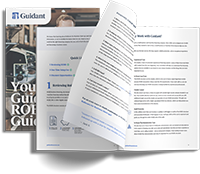Now that I’ve formed an LLC or Corporation, what comes next? This is the question that many new entrepreneurs face when they’re getting their start-ups off the ground, and the answer is that the next steps include plenty of paperwork. What should you prioritize first? We’ve rounded up the most common required documents for small businesses that you need to know about and start pulling together ASAP.
1) Articles of Incorporation
Don’t get this one mixed up with a certificate of incorporation. The two required documents play different roles: the certificate is used as proof of a corporation’s existence in a state and the articles of incorporate provide more information about your business. Some of this information includes:
- The corporation’s name.
- Corporation’s purpose.
- Name and address of the corporation’s registered agent.
- Stock information, such as the number of shares the corporation may issue.
- Incorporators of the corporation (AKA those signing and filing the articles).
2) Business Licenses/Permits
In order to own and operate most businesses, you’ll need the proper licenses and permits as required by your jurisdiction. Some common types include general business licenses, tax registrations and health department permits (where necessary). Outside of obtaining these documents, remember to renew licenses and permits before expiration deadlines to avoid paying for fines.
3) Trademarks and Copyrights
One of the biggest mistakes a small business can make when first starting out is failing to protect its intellectual property. File for trademarks and copyrights to protect assets like your brand logo, tagline, slogan and domain name. By doing this, you will retain the exclusive rights to these original works and be able to keep competitors from plagiarizing or copying your unique assets.
4) Operating Agreements and Bylaws
While most states don’t require LLCs to file operating agreements, having a written operating agreement in place is important because the document protects your limited liability status and helps prevent any financial and management disputes.
Bylaws, on the other hand, typically cover topics like how directors are elected, how meetings are organized, the functions of each corporate office and the summary of duties for those on the office roster. These must be consistent with the articles of incorporation, but bylaws may also be amended as necessary so long as they specify procedures for amendment.
5) Meeting Minutes
For every meeting your business has, minutes should be taken as an official account of the decisions made therein. These are not strenuous documents by any means and only require substantial information rather than every single detail from start to finish. Some required information includes the date, time and place of the meeting, those in attendance along with notes on whether they arrived or left early or late, a brief description of items on the agenda and voting actions.
6) Partnership Agreements
Going into business with a partner? Much as you may think you don’t need one, a partnership agreement is essential to ensuring you have your role in the business in writing. Three areas you’ll need to cover include the nature of your contribution (i.e. the amount of time and labor brought to the role), the value of your contribution and how a partner can terminate the agreement if needed.
7) DBAs
Also known as a “Doing Business As” name, a DBA is the name under which you do business. If your business conducts any form of business, even printing out business cards, under a name that isn’t your own, you’ll need to register for a DBA in the state you’re doing business in. While this is required in most states, the nice part is that once you conduct a name search and file for a DBA, that name will be claimed as your own. This will allow you to collect payments under the business name, and market and advertise your business publicly.


















